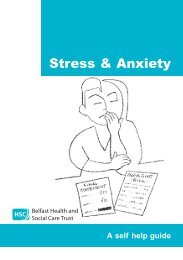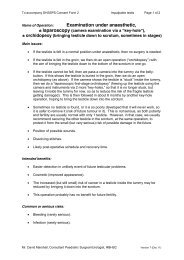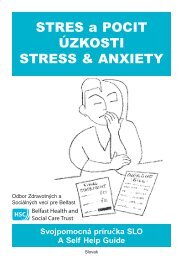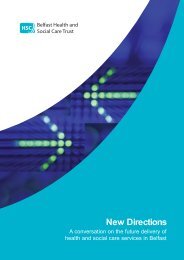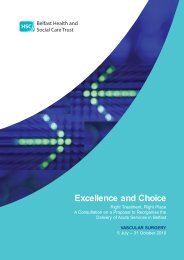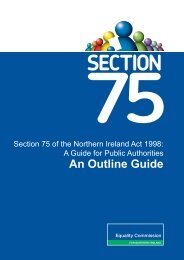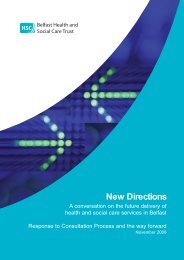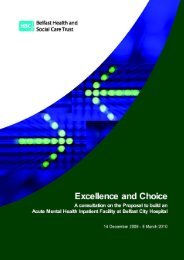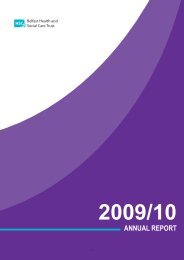Excellence and Choice in Learning Disability Services
Excellence and Choice in Learning Disability Services
Excellence and Choice in Learning Disability Services
You also want an ePaper? Increase the reach of your titles
YUMPU automatically turns print PDFs into web optimized ePapers that Google loves.
1.0 ForewordWilliam McKee, Chief ExecutiveThis consultation is be<strong>in</strong>g carried out by the Belfast Health <strong>and</strong> Social Care Trustto address the future delivery of adult learn<strong>in</strong>g disability services across the cityof Belfast.Improv<strong>in</strong>g the lives of people with learn<strong>in</strong>g disabilities is a priority for the NorthernIrel<strong>and</strong> Executive, the DHSSPSNI, the HSC Board <strong>and</strong> the Belfast HSC Trust.Citizenship <strong>and</strong> <strong>in</strong>clusion are key cornerstones to enabl<strong>in</strong>g people with learn<strong>in</strong>gdisabilities to live full <strong>and</strong> mean<strong>in</strong>gful lives. Equal Lives, the Learn<strong>in</strong>g <strong>Disability</strong>Report produced by the Bamford Review, stressed the importance to people withlearn<strong>in</strong>g disabilities of liv<strong>in</strong>g an ord<strong>in</strong>ary life, participat<strong>in</strong>g <strong>in</strong> society <strong>and</strong> access<strong>in</strong>gservices <strong>in</strong> the same way as the rest of the general population.Belfast HSC Trust works <strong>in</strong> partnership with a number of bodies to improve thehealth of the population <strong>and</strong> to ensure that high quality services are availablelocally. Significant <strong>in</strong>vestment has been made <strong>in</strong> recent years to improve the livesof people with learn<strong>in</strong>g disabilities by enhanc<strong>in</strong>g the services available to them <strong>in</strong>the community. This is part of a bigger plan to reduce the need for people to haveto go <strong>in</strong>to hospital <strong>and</strong> to support them liv<strong>in</strong>g with the fullest possible participationwith<strong>in</strong> their community. In addition, we aim to make the best use of all ourresources to promote services that are <strong>in</strong>dividualised <strong>and</strong> of a high st<strong>and</strong>ard.This document expla<strong>in</strong>s the reasons why we need to make changes to howcommunity services <strong>and</strong> <strong>in</strong>patient services are delivered <strong>in</strong> the city of Belfast <strong>and</strong><strong>in</strong> the regional services at Muckamore Abbey Hospital. It also presents anopportunity for you to comment on the plans. Please feel free to raise any otherissues that you th<strong>in</strong>k have been missed or that you believe need to be taken <strong>in</strong>toconsideration.The Belfast Trust is committed to engag<strong>in</strong>g with members of the public <strong>and</strong> looksforward to hear<strong>in</strong>g from you. Details of how to submit your feedback can be found<strong>in</strong> Appendix 3.As the Chief Executive of the Belfast HSC Trust I would like to thank you for your<strong>in</strong>terest <strong>in</strong> this consultation exercise <strong>and</strong> for tak<strong>in</strong>g the time to get <strong>in</strong>volved.3
1.1. Introduction / Policy ContextThis paper outl<strong>in</strong>es the proposed strategic direction for the learn<strong>in</strong>g disabilityservice <strong>in</strong> the Belfast Trust. Some consultation has already taken place withpeople with learn<strong>in</strong>g disabilities <strong>and</strong> their families <strong>in</strong> develop<strong>in</strong>g the strategy. Thepurpose of the paper is to seek views on the strategic direction for adult learn<strong>in</strong>gdisability services from the wider population.Regional policy for learn<strong>in</strong>g disability services has already been developedthrough the Bamford review on mental health <strong>and</strong> learn<strong>in</strong>g disability. The Reviewwas undertaken because it was recognised nationally that people with learn<strong>in</strong>gdisabilities were often marg<strong>in</strong>alised <strong>in</strong> society <strong>and</strong> found it difficult to access thesupport that they needed. Valu<strong>in</strong>g People was published <strong>in</strong> Engl<strong>and</strong> <strong>in</strong> 2001 <strong>and</strong>it laid out a strategy to improve the lives of people with learn<strong>in</strong>g disabilities <strong>in</strong>Engl<strong>and</strong>. Wales <strong>and</strong> Scotl<strong>and</strong> produced similar strategies <strong>and</strong> the BamfordReview was undertaken to exam<strong>in</strong>e what was needed <strong>in</strong> the Northern Irel<strong>and</strong>context.The Equal Lives report (2005) was the part of this review specifically aimed atpeople with learn<strong>in</strong>g disabilities <strong>and</strong> the Government’s Implementation ActionPlan (2009) was recently published to take forward the recommendations ofEqual Lives. The strategic direction of the Belfast Trust as outl<strong>in</strong>ed <strong>in</strong> this paperis <strong>in</strong> l<strong>in</strong>e with the recommendations <strong>in</strong> the Action Plan.The Equal Lives report highlighted that people with a learn<strong>in</strong>g disability <strong>in</strong>Northern Irel<strong>and</strong> do not enjoy equality of opportunity <strong>and</strong> that they are oftenexcluded from the opportunities that other citizens enjoy. The report went on tosay that whilst there had been some progress <strong>in</strong> mak<strong>in</strong>g people’s lives more<strong>in</strong>clusive, there was need for a major <strong>and</strong> co-ord<strong>in</strong>ated development programmefor learn<strong>in</strong>g disability services over the next 15 - 20 years <strong>in</strong> order to resolve fullythe difficulties outl<strong>in</strong>ed <strong>in</strong> the reportThe Belfast HSC Trust published New Directions <strong>in</strong> 2008 as a means ofcommunicat<strong>in</strong>g the Trust’s vision for the modernisation <strong>and</strong> reform of local health<strong>and</strong> social care services. The future development of learn<strong>in</strong>g disability servicesas outl<strong>in</strong>ed <strong>in</strong> New Directions was entirely <strong>in</strong> keep<strong>in</strong>g with the recommendationsof the Equal Lives report.This document goes further than New Directions <strong>and</strong> outl<strong>in</strong>es more detailed plansfor the future services <strong>in</strong> Belfast <strong>and</strong> at Muckamore Abbey Hospital.1.2 ResourcesThe Equal Lives report made 74 recommendations to take forward its vision forthe future provision of learn<strong>in</strong>g disability services. Full implementation of theserecommendations had an estimated additional cost of approximately £175 millionover a fifteen to twenty year period. It was recognised that these large sums ofmoney were not immediately available <strong>and</strong> accord<strong>in</strong>gly the Equal Lives report setout some immediate (2006 –2012) <strong>and</strong> medium -term (2012 –2020) objectives.4
Whilst the report acknowledged that change would be costly <strong>and</strong> would take time,it also stated that there must be an immediate <strong>and</strong> ongo<strong>in</strong>g commitment tomak<strong>in</strong>g f<strong>in</strong>ancial resources available if the change process is to be real. Whilstthe report recognised the need to reconfigure <strong>and</strong> better target exist<strong>in</strong>gresources, it also recognised that the level of change <strong>and</strong> modernisationenvisaged would not happen without this f<strong>in</strong>ancial commitment.The Department of Health has recognised that additional resources are requiredfor the adult learn<strong>in</strong>g disability service to deliver the modernisation of services setout <strong>in</strong> Equal Lives. Initially an extra £17m has been secured by the M<strong>in</strong>ister tobeg<strong>in</strong> this process with<strong>in</strong> N. Irel<strong>and</strong> over the 3-year period 2008/09 to 2010/11.The Belfast Trust’s share of this is almost £3.8m <strong>and</strong> the Health <strong>and</strong> Social CareBoard is mak<strong>in</strong>g this new <strong>in</strong>vestment available over the three year period. Thiswill enhance the range of adult community services available with<strong>in</strong> Belfast whichwill support the delivery of the proposed new adult learn<strong>in</strong>g disability servicemodel.The Belfast Trust currently has around £52m available annually from the Health<strong>and</strong> Social Care Board to support the delivery of adult learn<strong>in</strong>g disability services.The Trust however has to achieve efficiency sav<strong>in</strong>gs of 3% a year from 2008 –2011 as well as manag<strong>in</strong>g an underly<strong>in</strong>g deficit. This equates to £5m efficiencyto be achieved over the 3-year period for adult learn<strong>in</strong>g disability services. Theservice will use its exist<strong>in</strong>g resources <strong>and</strong> the new fund<strong>in</strong>g to <strong>in</strong>vest <strong>in</strong> moremodern services <strong>and</strong> achieve efficiencies.The challenge for the Trust over the next few years will therefore require us totake a radical review of both the core services <strong>and</strong> new <strong>in</strong>vestments to ensurethat we cont<strong>in</strong>ue to reform services whilst mak<strong>in</strong>g efficiencies at the same time.1.3 About the documentIt is aga<strong>in</strong>st this background that the Trust has developed this document, whichdescribes how the Trust proposes to deliver high quality adult learn<strong>in</strong>g disabilityservices <strong>in</strong> the future.The document outl<strong>in</strong>es:- The pr<strong>in</strong>ciples that have guided the proposed service models.- The <strong>in</strong>fluenc<strong>in</strong>g factors i.e. what Equal Lives says aboutservices.- How we currently provide services.- The way the Trust would propose to deliver adult learn<strong>in</strong>gdisability services <strong>in</strong>to the future.5
The implementation of aspects of this strategic direction will rely on appropriatelevels of fund<strong>in</strong>g be<strong>in</strong>g secured, as well as chang<strong>in</strong>g some of the ways wecurrently work.1.4 Guid<strong>in</strong>g Pr<strong>in</strong>ciplesThe fundamental pr<strong>in</strong>ciple underp<strong>in</strong>n<strong>in</strong>g reform <strong>in</strong> learn<strong>in</strong>g disability services is<strong>in</strong>dividualisation. People with learn<strong>in</strong>g disabilities want to have their needs metthrough a range of services that are flexible <strong>and</strong> diverse. This differs fromservices <strong>in</strong> the past that all too often failed to plan services around the person butrequired the person to fit <strong>in</strong>to exist<strong>in</strong>g provision. The direction of travel for theservice is away from congregated liv<strong>in</strong>g <strong>and</strong> large <strong>in</strong>stitutional establishmentstowards services that are flexible <strong>and</strong> tailored to suit the needs of an <strong>in</strong>dividual.In develop<strong>in</strong>g the direction, a number of pr<strong>in</strong>ciples were agreed on by serviceusers, carers <strong>and</strong> families <strong>and</strong> staff. These can be seen <strong>in</strong> Appendix 1.2.0 HOW SERVICES FOR ADULTS WITH LEARNINGDISABILITY ARE CURRENTLY DELIVEREDThere are three str<strong>and</strong>s to the services that will be delivered to people withlearn<strong>in</strong>g disabilities <strong>in</strong> the Belfast Trust. They are:-1. Somewhere to live <strong>and</strong> a fuller life.2. Access to additional support <strong>in</strong> the community, <strong>in</strong>clud<strong>in</strong>g specialistcommunity treatment <strong>and</strong> support services <strong>and</strong> respite.3. Access to specialist <strong>in</strong>patient assessment <strong>and</strong> treatment services.Each str<strong>and</strong> encompasses a range of services that people with learn<strong>in</strong>gdisabilities can access depend<strong>in</strong>g on their <strong>in</strong>dividual needs. The diagram belowillustrates this.6
3.0. SOMEWHERE TO LIVE AND A FULLER LIFE3.1 What Equal Lives said about hav<strong>in</strong>g somewhere to live:Some comments from Equal Lives were-An extended range of hous<strong>in</strong>g options should be developed for men <strong>and</strong> womenwith learn<strong>in</strong>g disability.All new hous<strong>in</strong>g with support provision for people with a learn<strong>in</strong>g disability shouldbe for no more than 5 <strong>in</strong>dividuals with a learn<strong>in</strong>g disability - preferably less -with<strong>in</strong> the same household.An additional 100 supported liv<strong>in</strong>g places per annum for the next 15 years (2005– 2020) should be developed to enable people to move from family care withouthav<strong>in</strong>g to be placed <strong>in</strong> <strong>in</strong>appropriate sett<strong>in</strong>gs.3.1.1 What the Trust currently providesThe majority of adults with a learn<strong>in</strong>g disability are accommodated <strong>and</strong> supporteddirectly by their parents <strong>and</strong> carers <strong>in</strong> the parental home. The Trust has a rangeof services designed to support parents <strong>and</strong> carers <strong>in</strong> their own homes but theTrust also provides a range of accommodation, both directly <strong>and</strong> through theprivate <strong>and</strong> voluntary sectors.The Trust currently has the follow<strong>in</strong>g range of accommodation across Belfast:Accommodation TypePlacesTrust Residential Homes 38Independent residential Homes 197Private Nurs<strong>in</strong>g Homes 263Supported hous<strong>in</strong>g tenancies (both Trust<strong>and</strong> <strong>in</strong>dependent sector) 1763.1.2 Future Plans for Accommodation Provision.A key objective for the Trust’s service is to support people with learn<strong>in</strong>gdisabilities <strong>in</strong> their own home first <strong>and</strong> foremost. For the majority this will be theirfamily home, for others this will be their own home, or hous<strong>in</strong>g they share withothers.The Trust will provide a range of supported liv<strong>in</strong>g options. This means thatpeople can be tenants or own their own home <strong>and</strong> receive the level of supportthat they need. This will range from m<strong>in</strong>imal support to <strong>in</strong>tensive 24 hour supportto enable adults with learn<strong>in</strong>g disability to cont<strong>in</strong>ue to live their lives <strong>in</strong> thecommunity <strong>and</strong> to enable those liv<strong>in</strong>g <strong>in</strong> hospital or residential or nurs<strong>in</strong>g homesto experience community liv<strong>in</strong>g.8
The use of residential accommodation <strong>and</strong> private nurs<strong>in</strong>g home facilities will, <strong>in</strong>future, only be used <strong>in</strong> exceptional circumstances where hous<strong>in</strong>g with supportoptions are not adequate or available. People who currently live <strong>in</strong> these types ofaccommodation will rema<strong>in</strong> there as long as it meets their needs but newadmissions will be by exception.Subject to available resources, the Trust, <strong>in</strong> conjunction with the Northern Irel<strong>and</strong>Hous<strong>in</strong>g Executive <strong>and</strong> Support<strong>in</strong>g People, will cont<strong>in</strong>ue the expansion ofsupported hous<strong>in</strong>g across the city of Belfast. It will do this at a levelcommensurate with the need to resettle adults from Muckamore Abbey Hospital<strong>and</strong> <strong>in</strong> order to meet the grow<strong>in</strong>g dem<strong>and</strong> for ord<strong>in</strong>ary hous<strong>in</strong>g from adults withlearn<strong>in</strong>g disability already liv<strong>in</strong>g <strong>in</strong> the community.Subject to available resources, the Trust proposes to replace its four rema<strong>in</strong><strong>in</strong>gresidential homes with a range of supported liv<strong>in</strong>g options. Many of the peoplewho currently live <strong>in</strong> these homes have told us that they would like a place of theirown where they do not have to share with so many other people. Our plan is toprovide this for those residents <strong>in</strong> a way that cont<strong>in</strong>ues to meet their needs.3.2 What Equal Lives says about A Fuller Life:Some comments from Equal Lives are as follows:-A new service model needs to be developed, based on social <strong>in</strong>tegration,draw<strong>in</strong>g a l<strong>in</strong>e under the notion that people with a learn<strong>in</strong>g disability should begrouped together <strong>and</strong> segregated from services enjoyed by the rest of thepopulation.Day centres will <strong>in</strong> future provide a service to men <strong>and</strong> women with <strong>in</strong>creas<strong>in</strong>glycomplex needs who should also be enabled to access opportunities forcommunity <strong>in</strong>tegration.Future <strong>in</strong>vestments <strong>in</strong> day services should be targeted at the development ofother supported placements <strong>in</strong>clud<strong>in</strong>g voluntary work <strong>and</strong> leisure opportunities.Supported employment services should be developed further.3.2.1 What the Trust currently providesHav<strong>in</strong>g a Fuller Life <strong>in</strong>cludes be<strong>in</strong>g mean<strong>in</strong>gfully occupied. One of the ways <strong>in</strong>which the Trust helps with this is through the provision of day services.Day services range from be<strong>in</strong>g supported <strong>in</strong>to full employment, to attendance <strong>in</strong> aday centre, with a variety of options along this cont<strong>in</strong>uum.The Trust has already made significant progress <strong>in</strong> develop<strong>in</strong>g its community dayservices model <strong>in</strong> partnership with other statutory <strong>and</strong> voluntary sectororganisations. This model enables <strong>in</strong>dividuals, with staff support, to develop theirown plan for the week which is likely to <strong>in</strong>clude further education, social <strong>and</strong>leisure activities <strong>and</strong> other tra<strong>in</strong><strong>in</strong>g opportunities.9
This supports the concept of <strong>in</strong>dividualisation <strong>and</strong> allows people to mix <strong>and</strong> matchfrom a range of activities to suit their own needs.The follow<strong>in</strong>g services are <strong>in</strong> place. (They are not mutually exclusive).Service typePeople supportedDay centres 620Employment 100<strong>and</strong> tra<strong>in</strong><strong>in</strong>gservicesCommunity 110day services3.2.2 Future Plans for Lead<strong>in</strong>g Fuller LivesThe focus for the future will be to move away from large congregated day centres<strong>and</strong> to cont<strong>in</strong>ue to build on the more flexible model provided through communityday services. This relies less on build<strong>in</strong>gs <strong>and</strong> more on the provision of<strong>in</strong>dividualised support to access a range of activities <strong>and</strong> opportunities available<strong>in</strong> local communities.The Trust does acknowledge however, that that there are a significant number of<strong>in</strong>dividuals who are used to receiv<strong>in</strong>g day services <strong>in</strong> a day centre <strong>and</strong> who at thistime would be reluctant to consider more <strong>in</strong>clusive community based options.Whilst many <strong>in</strong>dividuals who currently attend day centres value the supportprovided there, as do their families, the Trust does not believe that a majority ofadults with learn<strong>in</strong>g disabilities, hav<strong>in</strong>g the choice, would choose to spend theirdays <strong>in</strong> a day centre.In the first <strong>in</strong>stance the Trust will focus these developments primarily to meet theneeds of school leavers, bear<strong>in</strong>g <strong>in</strong> m<strong>in</strong>d that these young people are leav<strong>in</strong>gschool with different expectations <strong>and</strong> aspirations than those who have beenreceiv<strong>in</strong>g traditional forms of day service.The provision of centre based day support has already been reviewed by thelegacy Belfast Trusts <strong>and</strong> plans exist to re-provide exist<strong>in</strong>g out dated centres withsmaller, purpose built facilities provid<strong>in</strong>g no more than forty places at a time. Thisdevelopment is however, dependant on capital be<strong>in</strong>g made available.There is an underst<strong>and</strong><strong>in</strong>g that some people with complex needs who are unableto mean<strong>in</strong>gfully participate <strong>in</strong> <strong>in</strong>tegrated community opportunities may still requirea build<strong>in</strong>g based solution. Plans have been designed to ensure that any newcentres can accommodate such <strong>in</strong>dividuals, provid<strong>in</strong>g them with an enhancedservice at the same time as facilitat<strong>in</strong>g high levels of socialisation <strong>and</strong> <strong>in</strong>clusionfor them. This means that <strong>in</strong>creas<strong>in</strong>gly people with learn<strong>in</strong>g disabilities can be <strong>in</strong>receipt of day services that are not provided through the traditional model ofattendance at a day centre.10
The Trust, <strong>in</strong> partnership with the voluntary sector, will support the furtherdevelopment of the supported employment model <strong>and</strong> supported employmentopportunities <strong>in</strong> Belfast.A multiagency partnership approach is already well developed which provides arange of tra<strong>in</strong><strong>in</strong>g opportunities <strong>and</strong> real jobs for <strong>in</strong>dividuals with learn<strong>in</strong>gdisabilities throughout Belfast. The Trust has been <strong>in</strong>strumental <strong>in</strong> develop<strong>in</strong>gthis <strong>and</strong> will cont<strong>in</strong>ue to view it as a high priority so that people with learn<strong>in</strong>gdisabilities can be supported <strong>in</strong>to employment.As the largest employer <strong>in</strong> Belfast the Trust will engage proactively with others <strong>in</strong>the sector <strong>in</strong> provid<strong>in</strong>g real job opportunities for adults with learn<strong>in</strong>g disabilities.4.0 HAVING ACCESS TO ADDITIONAL SUPPORT IN THECOMMUNITY, INCLUDING SPECIALIST COMMUNITYTREATMENT AND SUPPORT SERVICES AND RESPITE4.1 What Equal Lives said about community support <strong>and</strong>Treatment:People with a learn<strong>in</strong>g disability should have access to the wide range ofspecialist health care services available <strong>in</strong> the community <strong>in</strong>clud<strong>in</strong>g neurologyservices, epilepsy nurse specialists <strong>and</strong> diabetes nurse specialists.Community based assessment <strong>and</strong> treatment services should be developed onan <strong>in</strong>cremental basis to provide assessment <strong>and</strong> treatment of men <strong>and</strong> womenwith a learn<strong>in</strong>g disability who have specific mental health needs <strong>and</strong>/orchalleng<strong>in</strong>g behaviours.There is a need for Community Forensic <strong>Services</strong> to support the full range ofpeople with a learn<strong>in</strong>g disability <strong>in</strong> the community, <strong>in</strong>clud<strong>in</strong>g those who have beendischarged from hospital or released from prison.4.1.1 What the Trust Currently ProvidesIn Belfast, this str<strong>and</strong> of the service currently relies on 4 community learn<strong>in</strong>gdisability teams, supported by a very small specialist service for people with morecomplex difficulties.The community teams are made up of social workers, community learn<strong>in</strong>gdisability nurses <strong>and</strong> support workers with <strong>in</strong>put from psychiatry, psychology <strong>and</strong>the allied health professions. The teams assist people with learn<strong>in</strong>g disabilities tolive as <strong>in</strong>dependently as possible <strong>and</strong> to access the services that they need.4.1.2 Future plans for community treatment <strong>and</strong> supportThe service aims to provide this str<strong>and</strong> of the service <strong>in</strong> three different levels ortiers.11
Level 1Many people with learn<strong>in</strong>g disabilities do not need specialist services <strong>and</strong> shouldbe able to access the same health <strong>and</strong> social care services as the rest of thepopulation with little or no support. Individuals who are able to do this, maycontact staff <strong>in</strong> community teams from time to time for advice or to accessadditional support, e.g. how to f<strong>in</strong>d employment, but are likely to have m<strong>in</strong>imalcontact with learn<strong>in</strong>g disability services.Level 2The community teams provide this tier of service. Their core role will rema<strong>in</strong> oneof provid<strong>in</strong>g support to service users <strong>and</strong> their families, signpost<strong>in</strong>g <strong>in</strong>dividualstowards appropriate services <strong>and</strong> fulfill<strong>in</strong>g statutory functions such as assess<strong>in</strong>g<strong>and</strong> manag<strong>in</strong>g risk <strong>and</strong> vulnerability.Sometimes services that are available to everyone (ma<strong>in</strong>stream services), needsome help from learn<strong>in</strong>g disability staff to be able to meet the needs of peoplewith learn<strong>in</strong>g disabilities. So the second tier of service also encompasses thesupport that the teams provide to ma<strong>in</strong>stream services to make suitableadjustments <strong>in</strong> order for their services to be accessible to people with learn<strong>in</strong>gdisabilities. Examples of work already underway are <strong>in</strong> hospital neurologyservices <strong>and</strong> family <strong>and</strong> childcare services. Primary care services are anothergood example of people us<strong>in</strong>g ma<strong>in</strong>stream services with m<strong>in</strong>imal support. Thelearn<strong>in</strong>g disability service has been funded to beg<strong>in</strong> assist<strong>in</strong>g GPs with deliver<strong>in</strong>gimproved health screen<strong>in</strong>g for people with learn<strong>in</strong>g disabilities. This is a positivedevelopment <strong>in</strong> help<strong>in</strong>g people use ord<strong>in</strong>ary services with m<strong>in</strong>imal adjustments.Over time, the teams will be exp<strong>and</strong>ed to become fully multidiscipl<strong>in</strong>ary so thatpeople can more easily access the range of support that they need. Staff <strong>in</strong> theteams will develop service networks with other services such as dementia,addictions <strong>and</strong> services for older people with the aim of assist<strong>in</strong>g people withlearn<strong>in</strong>g disabilities to get the same level of service as the rest of the population.Networks to support parents with learn<strong>in</strong>g disability <strong>and</strong> young persons leav<strong>in</strong>gcare will also be further developedLevel 3This relates to specialist community services <strong>and</strong> <strong>in</strong> 2009/10, the expansion ofmore specialist community treatment services will beg<strong>in</strong>. The <strong>in</strong>vestment willenable the development of a specialist community mental health team <strong>and</strong> theexpansion of the behavioural service. This will enable people with learn<strong>in</strong>gdisabilities <strong>in</strong> Belfast who require specialist mental health support to receive this<strong>in</strong> a community sett<strong>in</strong>g.Exist<strong>in</strong>g specialist treatment options will be enhanced/ provided across the city ofBelfast. These options will <strong>in</strong>clude:Development of a service for people with learn<strong>in</strong>g disabilities who havecomplex mental health difficulties. This service will be developed from theexist<strong>in</strong>g Hear to Help Service which currently delivers psychologicaltherapies <strong>and</strong> emotional support. The newly developed service will deliverboth assertive outreach <strong>and</strong> psychological <strong>in</strong>terventions.12
Enhanced Behaviour Support Service, a time limited <strong>in</strong>tensiveassessment <strong>and</strong> <strong>in</strong>tervention service, which reduces placementbreakdown <strong>and</strong> <strong>in</strong>creases capacity of <strong>in</strong>dividuals, families <strong>and</strong> serviceproviders to cope with behaviour that challenges.Community Forensic Service, provid<strong>in</strong>g risk assessment <strong>and</strong> offencerelated <strong>in</strong>tervention services to those with histories of, <strong>and</strong> at risk of,offend<strong>in</strong>g.These services will be person centred, task focused <strong>and</strong> offer short <strong>in</strong>terventionsbased on the need of <strong>in</strong>dividuals. They will be developed over time commenc<strong>in</strong>g<strong>in</strong> 2010/11.The specialist community treatment service has a longer term aim of be<strong>in</strong>g ableto support people <strong>in</strong> their own homes 24hours a day, 365 days a year. This willrequire the enhancement of community treatment teams <strong>and</strong> support services,which would wrap around the <strong>in</strong>dividual <strong>and</strong> or family <strong>in</strong> times of <strong>in</strong>creased need.It will provide an enhanced level of treatment <strong>and</strong> support required to support the<strong>in</strong>dividual <strong>in</strong> their normal place of residence or <strong>in</strong> the community <strong>and</strong> avoidescalation of the situation.4.2 Respite <strong>Services</strong>4.2.1 What Equal Lives said about Respite <strong>Services</strong>:Respite will have a focus on the support needs of parents <strong>and</strong> carers.Respite services will also be designed <strong>and</strong> delivered <strong>in</strong> an <strong>in</strong>dividualised wayensur<strong>in</strong>g that they meet the aspirations of the person for a stimulat<strong>in</strong>g break fromtheir normal support arrangements.Respite will be designed <strong>and</strong> delivered <strong>in</strong> a way that is conscience free that isenabl<strong>in</strong>g parents <strong>and</strong> carers to relax <strong>in</strong> the knowledge that the person theysupport is hav<strong>in</strong>g an enjoyable experience.4.2.2 What the Trust currently providesRespite provision currently encompasses short stays <strong>in</strong> residentialaccommodation, short stays with another family <strong>and</strong> a range of social <strong>and</strong> leisureactivities. Some of this is provided directly by the Trust <strong>and</strong> some by voluntarypartners. The Trust has 19 places for residential respite <strong>and</strong> contracts with the<strong>in</strong>dependent sector for a further 9 places. The Trust provides respite services toapproximately 520 people.4.2.3 Future Plans for Respite ProvisionResidential respite services will be provided <strong>in</strong> dedicated respite facilities withno more than four beds <strong>in</strong> any one facility. The first of these is planned fordevelopment <strong>in</strong> East Belfast.13
Respite services will be developed to meet the needs of those adults withspecific complex health needs <strong>and</strong> those with challeng<strong>in</strong>g support needs.The provision of community/ leisure - based respite exemplified by the Car<strong>in</strong>gBreaks service will be enhanced <strong>and</strong> developed to become accessible to all. TheTrust recognises the <strong>in</strong>creas<strong>in</strong>g importance placed by families on this form ofnon-residential provision.The Trust will <strong>in</strong>crease the opportunities to experience family placement as aform of respite break.5.0 ACCESS TO INPATIENT ASSESSMENT AND TREATMENTSERVICES.5.1 What Equal Lives said about <strong>in</strong>patient assessment <strong>and</strong>treatment services:The focus of the Equal Lives report was on the development of communityservices with little emphasis given to Inpatient services. However the follow<strong>in</strong>gstatements were made:There must be a full range of forensic <strong>in</strong>patient care, <strong>in</strong>clud<strong>in</strong>g high, medium <strong>and</strong>low security services.By June 2011, all people with a learn<strong>in</strong>g disability liv<strong>in</strong>g <strong>in</strong> a hospital should berelocated to the community. Funds need to be provided to ensure that onaverage 80 people will be resettled per annum over the 5-year period from 2006to 2011. (Subsequently, the M<strong>in</strong>ister of Health set a target that no-one should liveunnecessarily <strong>in</strong> hospital beyond 2014.)As a matter of urgency the Department of Health, Social <strong>Services</strong> <strong>and</strong> PublicSafety should consult with all 4 Health <strong>and</strong> Social <strong>Services</strong> Boards about theirpresent <strong>and</strong> future plans for specialist assessment <strong>and</strong> treatment services formen <strong>and</strong> women with a severe learn<strong>in</strong>g disability with a view to greater shar<strong>in</strong>g ofexist<strong>in</strong>g <strong>and</strong> planned resources <strong>and</strong> the development of new forms of communitybased services.5.1.1 What the Trust currently providesMuckamore Abbey Hospital provides a regional specialist assessment <strong>and</strong>treatment service for people with learn<strong>in</strong>g disability who require a period of<strong>in</strong>patient care, allow<strong>in</strong>g assessment <strong>and</strong> treatment of their mental health <strong>and</strong>complex behavioural needs. New build<strong>in</strong>gs have been developed which providea therapeutic environment for assessment <strong>and</strong> treatment <strong>and</strong> for a regional<strong>in</strong>patient forensic service for men with learn<strong>in</strong>g disabilities.There are <strong>in</strong> addition, a number of people (174) <strong>in</strong> the hospital who are liv<strong>in</strong>g <strong>in</strong>Muckamore Abbey Hospital because resources have not been made available forthem to resettle to appropriate community sett<strong>in</strong>gs.14
Although the care provided to these <strong>in</strong>dividuals is of a high st<strong>and</strong>ard, theenvironment that they live <strong>in</strong> is <strong>in</strong>adequate <strong>and</strong> no-one should live <strong>in</strong> a hospital ifthey do not need to do so.5.1.2 Future Plans for Inpatient Assessment <strong>and</strong> Treatment<strong>Services</strong>The children’s assessment <strong>and</strong> treatment service will move from the Muckamoresite to Belfast <strong>in</strong> March 2010. A new purpose built centre is be<strong>in</strong>g developedwhich will provide 8 beds for children from the Belfast Trust, the Northern Trust,South Eastern Trust <strong>and</strong> Southern Trust.Some adults with a learn<strong>in</strong>g disability who require a period of <strong>in</strong>patientassessment <strong>and</strong> treatment for mental illness can receive this <strong>in</strong> ma<strong>in</strong>streammental health services. In Belfast, there are plans for a new <strong>in</strong>patient mentalhealth unit <strong>and</strong> the learn<strong>in</strong>g disability service will work with colleagues <strong>in</strong> mentalhealth services to ensure that people with learn<strong>in</strong>g disability have access to thisfacility.Other people require support from learn<strong>in</strong>g disability services to enable them tobenefit from ma<strong>in</strong>stream mental health services. Once aga<strong>in</strong>, for people <strong>in</strong>Belfast, we will develop improved ways of work<strong>in</strong>g across mental health <strong>and</strong>learn<strong>in</strong>g disability services to make this happen.A third group of adults will require the support provided by a specialist <strong>in</strong>patientlearn<strong>in</strong>g disability service <strong>and</strong> this is what the new facilities <strong>in</strong> Muckamore AbbeyHospital will provide <strong>in</strong> future.Equal Lives recommended that shar<strong>in</strong>g of <strong>in</strong>patient resources on a regional basisshould be given further consideration. The Belfast service has started toexam<strong>in</strong>e regional care pathways with the other two learn<strong>in</strong>g disability hospitals <strong>in</strong>Northern Irel<strong>and</strong> <strong>and</strong> the Health <strong>and</strong> Social Care Board. The outcome of thiswork, alongside the future development of community treatment services, willhelp shape the future bed numbers at Muckamore Abbey Hospital.5.1.3 ResettlementBelfast Trust, <strong>in</strong> collaboration with Northern Trust, South Eastern Trust <strong>and</strong> theHealth <strong>and</strong> Social Care Board, has produced a paper for the Department ofHealth <strong>and</strong> Social <strong>Services</strong> which describes a costed model to complete theresettlement of patients from Muckamore Abbey Hospital. There is a M<strong>in</strong>isterialtarget which states that no-one should live unnecessarily <strong>in</strong> hospital beyond2014. The paper outl<strong>in</strong>es the resources <strong>and</strong> actions that are necessary toachieve this target.When these <strong>in</strong>dividuals have been successfully resettled to new facilities, theirbeds will be closed.15
6.0 CONCLUSIONThis paper has highlighted that the Trust will aim to improve the lives of adultswith learn<strong>in</strong>g disabilities by modernis<strong>in</strong>g services <strong>and</strong> develop<strong>in</strong>g new ones thatsupport the pr<strong>in</strong>ciples of <strong>in</strong>dividualisation <strong>and</strong> <strong>in</strong>clusion. The Trust recognisesthat there will be challenges <strong>in</strong> do<strong>in</strong>g this <strong>in</strong> the current f<strong>in</strong>ancial climate but willaim to make the best use of exist<strong>in</strong>g resources <strong>and</strong> any new <strong>in</strong>vestment to deliverthe services that people with learn<strong>in</strong>g disabilities have said they want <strong>and</strong> whichare detailed <strong>in</strong> Equal Lives.There is an opportunity for you to have a say about the strategy outl<strong>in</strong>ed <strong>in</strong> thispaper by consider<strong>in</strong>g the questions <strong>in</strong> Appendix 3.16
Appendix 1Guid<strong>in</strong>g pr<strong>in</strong>ciples<strong>Services</strong> will focus on the needs of <strong>in</strong>dividuals.People with learn<strong>in</strong>g disabilities <strong>and</strong> their carers will be fully <strong>in</strong>volved <strong>in</strong> theplann<strong>in</strong>g <strong>and</strong> development of their own health <strong>and</strong> social care services.People with learn<strong>in</strong>g disabilities have the right to experience communityliv<strong>in</strong>g, community presence <strong>and</strong> participation. Inclusion is a right for all.People with learn<strong>in</strong>g disabilities <strong>in</strong> Belfast have the right to experience thesame level of service regardless of location.Service improvement <strong>and</strong> modernisation will be based on best practice.Staff will be supported <strong>in</strong> their professional <strong>and</strong> personal development.<strong>Services</strong> will be delivered <strong>in</strong> an efficient <strong>and</strong> effective manner with<strong>in</strong>available resources.These pr<strong>in</strong>ciples are consistent with the Equal Lives Review, New Directions <strong>and</strong>the Belfast Way, the strategic direction for Belfast Health <strong>and</strong> Social Care Trust2008 to 2013.17
Appendix 2Programme of consultationThis paper is based on the strategic direction set out <strong>in</strong> Equal Lives which waswidely consulted on. The document is therefore the Trust’s means ofcommunicat<strong>in</strong>g how it will beg<strong>in</strong> to address the recommendations of Equal Lives.The Trust wishes to receive comments from the citizens of Belfast <strong>and</strong> fromfamilies elsewhere who have relatives <strong>in</strong> Muckamore Abbey Hospital about thedirection of travel outl<strong>in</strong>ed here.The consultation period will open on 12 thFebruary 2010.November 2009 <strong>and</strong> close on 12 thWe are send<strong>in</strong>g this paper to staff, service users <strong>and</strong> carers <strong>and</strong> keystakeholders to ensure we consult as widely as possible. Based on theresponses we receive, a report will be presented to Trust Board.An Easy Read version of the paper will be circulated to service users <strong>and</strong> Truststaff will be arrang<strong>in</strong>g to discuss the content of the paper with service users whowish to do so.Further consultation may be required on specific service issues as a result of theresponses we receive. We are committed to ensur<strong>in</strong>g that we consult broadly onthese issues.18
Appendix 3Tell us your views - Your <strong>in</strong>vitation to commentWe would like to hear your views on the proposals that we have madefor the future delivery of adult learn<strong>in</strong>g disability services <strong>in</strong> the city ofBelfast <strong>and</strong> at Muckamore Abbey Hospital.Please use this form to register your comments by 12 th February2010.Please tell us your name <strong>and</strong> address at the beg<strong>in</strong>n<strong>in</strong>g of your reply. If you arecomment<strong>in</strong>g on behalf of an organisation, please tell us its name <strong>and</strong> what itdoes. If you have consulted other people or organisations, please let us know.The consultation period will open on 12 thFebruary 2010.November 2009 <strong>and</strong> close on 12 thResponses <strong>in</strong> writ<strong>in</strong>g should be sent to:William McKee, Chief ExecutiveBelfast Health <strong>and</strong> Social Care Trustc/o Public Liaison <strong>Services</strong>Communication Department1 st Floor, Nore VillaKnockbracken Healthcare ParkSa<strong>in</strong>tfield RoadBelfast BT8 8BHAlternatively, comments may also be emailed to:Publicliaison@belfasttrust.hscni.netIt would be helpful if you could entitle your email ‘Consultation’.19
1. Somewhere to live <strong>and</strong> a fuller life.The Trust is propos<strong>in</strong>g:1. An expansion of supported hous<strong>in</strong>g across the city of Belfast2. The replacement of the four rema<strong>in</strong><strong>in</strong>g residential homes with a range ofsupported hous<strong>in</strong>g options for the people who live there to improve theirquality of life.3. The further enhancement of its community based (non centre) daytimeprovision for adults with learn<strong>in</strong>g disability, focus<strong>in</strong>g <strong>in</strong>itially on the needsof school leavers.4. The re-provision of exist<strong>in</strong>g out dated centres with purpose built facilitiesprovid<strong>in</strong>g no more than forty places at a time.5. That <strong>in</strong> future day centres will only provide services for people who areunable to mean<strong>in</strong>gfully participate <strong>in</strong> <strong>in</strong>tegrated community opportunities.6. The further development of the supported employment model <strong>and</strong>supported employment opportunities <strong>in</strong> Belfast.Question 1.(a) Do you agree with the above Trust proposals <strong>in</strong> relation to hav<strong>in</strong>gsomewhere to live <strong>and</strong> a fuller life?..............................................................................................................................................................................................................................................(b) What are your concerns about accommodation <strong>and</strong> day services <strong>and</strong> doyou th<strong>in</strong>k these plans will answer your concerns? If not, why not?..............................................................................................................................................................................................................................................(c) Do you have any suggested additions to these plans?..............................................................................................................................................................................................................................................(d) Are there any other issues that you th<strong>in</strong>k need to be taken <strong>in</strong>toconsideration?Please state them here:......................................................................................................................................................................................................................................................................................................................................................................................................20
2. Access to additional support <strong>in</strong> the community, <strong>in</strong>clud<strong>in</strong>gspecialist community treatment <strong>and</strong> support services <strong>and</strong>respite.The Trust is propos<strong>in</strong>g:1. The reprovision of residential respite services <strong>in</strong> dedicated respite facilitiesno more than four beds <strong>in</strong> any one facility.2. Enhancement of Community/ leisure - based respite.3. Increase of Family respite placements as a form of respite break.4. Increased access to ma<strong>in</strong>stream services where appropriate.5. The expansion of Multidiscipl<strong>in</strong>ary Community Learn<strong>in</strong>g <strong>Disability</strong> Teamsto provide proactive services <strong>and</strong> support to people with learn<strong>in</strong>g disabilityto access ma<strong>in</strong>stream & learn<strong>in</strong>g disability specific services.6. Development of Specialist service networks <strong>in</strong>clud<strong>in</strong>g epilepsy services,genetics, complex health services, autism services, primary care mentalhealth services, dementia services, <strong>and</strong> addictions services.7. Development of Specialist Mental Health <strong>and</strong> enhancement of Behavioural<strong>Services</strong>.8. Enhancement of specialist treatment options provided across the city ofBelfast, <strong>in</strong>clud<strong>in</strong>g a community forensic service.QUESTION 2:(a) Do you agree with the development plans for community treatment <strong>and</strong>Support (Includ<strong>in</strong>g respite) services outl<strong>in</strong>ed above?.............................................................................................................................................................................................................................................(b) What are your concerns about these community services <strong>and</strong> do you th<strong>in</strong>kthese plans will answer your concerns? If not, why not?..............................................................................................................................................................................................................................................(c) Do you have any suggested additions to these plans?..............................................................................................................................................................................................................................................21
(d) Are there any other issues that you th<strong>in</strong>k need to be taken <strong>in</strong>toconsideration?..............................................................................................................................................................................................................................................Please state them here:............................................................................................................................................................................................................................................................................................................................................................................................................................................................................................3. Access to specialist <strong>in</strong>patient assessment <strong>and</strong> treatmentservices.The Trust is propos<strong>in</strong>g:To provide access to acute <strong>in</strong>patient mental health beds for people withhigh levels of adaptive function<strong>in</strong>g/mild learn<strong>in</strong>g disability who requiretherapeutic <strong>in</strong>tervention as a result of mental health problems.To br<strong>in</strong>g forward a plan to resettle all rema<strong>in</strong><strong>in</strong>g longstay patients fromMuckamore Abbey hospital by 2014 subject to the appropriate levels offund<strong>in</strong>g be<strong>in</strong>g available.To commence a discussion with all relevant stakeholders on the future of<strong>in</strong>patient specialist assessment <strong>and</strong> treatment services at MuckamoreAbbey hospital.QUESTION 3:Do you agree with the development plans for specialist <strong>in</strong>patientassessment <strong>and</strong> treatment services outl<strong>in</strong>ed above?..............................................................................................................................................................................................................................................(e) What are your concerns about specialist <strong>in</strong>patient assessment <strong>and</strong>treatment services <strong>and</strong> do you th<strong>in</strong>k these plans will answer yourconcerns? If not, why not?..............................................................................................................................................................................................................................................22
(f) Do you have any suggested additions to these plans?..............................................................................................................................................................................................................................................(g) Are there any other issues that you th<strong>in</strong>k need to be taken <strong>in</strong>toconsideration?..............................................................................................................................................................................................................................................Please state them here:............................................................................................................................................................................................................................................................................................................................................................................................................................................................................................23
Appendix 4Availability <strong>in</strong> other formatsIn the <strong>in</strong>terest of accessibility the Future Development of Learn<strong>in</strong>g <strong>Disability</strong><strong>Services</strong>, this document can be made available <strong>in</strong> a range of alternative formats,<strong>in</strong>clud<strong>in</strong>g an Easy Read version.For further <strong>in</strong>formation please contact:Communication <strong>Services</strong>Belfast Health <strong>and</strong> Social Care TrustRoe VillaKnockbracken Healthcare ParkSa<strong>in</strong>tfield RoadBelfastBT8 8BHTel: 028 90 565641Email: <strong>in</strong>ternalcomms@belfasttrust.hscni.net24
Appendix 5Equality <strong>and</strong> Human RightsHuman rights belong to everyone – they are the basic rights that we all havesimply because we are human, regardless of who we are, where we live or whatwe do.Human rights cover those th<strong>in</strong>gs which are important to us such as be<strong>in</strong>g able tohave a choice as to how to live our lives <strong>and</strong> be<strong>in</strong>g entitled to respect, dignity <strong>and</strong>privacy.The basis of human rights is founded on 5 values, which are Fairness, Respect,Equality, Dignity <strong>and</strong> Autonomy.Equality <strong>in</strong> health <strong>and</strong> social care does not mean everyone receiv<strong>in</strong>g equaltreatment – equality means <strong>in</strong>dividuals access<strong>in</strong>g the highest atta<strong>in</strong>able st<strong>and</strong>ardof health <strong>and</strong> social care, which meets their needs.The pr<strong>in</strong>ciples of human rights <strong>and</strong> equality have been core to the delivery <strong>and</strong>policy formulation with<strong>in</strong> learn<strong>in</strong>g disability services. <strong>Services</strong>, which uphold <strong>and</strong>promote equality <strong>and</strong> human rights, will enhance the experience <strong>and</strong> outcomesfor service users <strong>and</strong> staff by us<strong>in</strong>g a person centred approach. In 1998 the<strong>in</strong>troduction of Section 75 of the Northern Irel<strong>and</strong> Act <strong>and</strong> the Human Rights Actenshr<strong>in</strong>ed these pr<strong>in</strong>ciples <strong>in</strong> legislation <strong>in</strong> Northern Irel<strong>and</strong>.Under Section 75 of the Northern Irel<strong>and</strong> Act 1998, the Belfast HSC Trust isobliged to consider the implications for equality of opportunity <strong>and</strong> good relations.As part of this assessment, the Trust also considers implications for human rights<strong>and</strong> disability.Section 75 of the Northern Irel<strong>and</strong> Act 1998Section 75 (1) of the NI Act 1998 requires Belfast HSC Trust, <strong>in</strong> carry<strong>in</strong>g out itwork, to have due regard to the need to promote equality of opportunity: Between persons of different religious belief, political op<strong>in</strong>ion, racial group,age, marital status or sexual orientation Between men <strong>and</strong> women generally Between persons with a disability <strong>and</strong> persons without Between persons with dependants <strong>and</strong> persons withoutIn addition Section 75 (2) requires the Trust to have regard to the desirability ofpromot<strong>in</strong>g good relations between persons of different religious belief, politicalop<strong>in</strong>ion or racial group.This meant that a Public Authority such as the Belfast Health <strong>and</strong> Social CareTrust is not only morally <strong>and</strong> ethically bound to deliver its learn<strong>in</strong>g disabilityservices to its users <strong>in</strong> an equitable fashion with respect <strong>and</strong> dignity; but it also isstatutorily bound to do so.25
Any service user or potential user of learn<strong>in</strong>g disability services should be treatedwith respect, sensitivity <strong>and</strong> dignity irrespective of age, disability, ethnic orig<strong>in</strong>,religious belief or political op<strong>in</strong>ion, gender or marital status or sexual orientationor car<strong>in</strong>g responsibilities.Key stakeholders can now have their say <strong>in</strong> how the Belfast Health <strong>and</strong> SocialCare Trust reforms <strong>and</strong> modernises its Learn<strong>in</strong>g <strong>Disability</strong> <strong>Services</strong>.The Belfast Health <strong>and</strong> Social Care Trust is committed to listen<strong>in</strong>g to the view ofstaff, service users, carers <strong>and</strong> families <strong>and</strong> advocacy groups <strong>and</strong> the widerpublic <strong>and</strong> mak<strong>in</strong>g <strong>in</strong>formed decisions on the basis of these consultationresponses.The Trust is committed to the pr<strong>in</strong>ciples of Equality <strong>and</strong> Human Rightsunderp<strong>in</strong>n<strong>in</strong>g the delivery <strong>and</strong> policy formulation of Learn<strong>in</strong>g <strong>Disability</strong> <strong>Services</strong>.The Trust welcomes any comments on Equality <strong>and</strong> Human Rights that youconsider relevant on the views detailed <strong>in</strong> this paper.26
Appendix 6Freedom of Information Act (2000) – Confidentiality ofConsultationsBelfast Trust will publish an anonymised summary of responses follow<strong>in</strong>gcompletion of the consultation process; however your response, <strong>and</strong> all otherresponses to the consultation, may be disclosed on request. We can only refuseto disclose <strong>in</strong>formation <strong>in</strong> limited circumstances. Before you submit yourresponse, please read the paragraphs below on the confidentiality ofconsultations <strong>and</strong> they will give you guidance on the legal position about any<strong>in</strong>formation given by you <strong>in</strong> response to this consultation.The Freedom of Information Act gives the public a general right of access to any<strong>in</strong>formation held by a public authority, namely, Belfast Trust <strong>in</strong> this case. Thisright of access to <strong>in</strong>formation <strong>in</strong>cludes <strong>in</strong>formation provided <strong>in</strong> response to aconsultation. We cannot automatically consider <strong>in</strong>formation supplied to us <strong>in</strong>response to a consultation as <strong>in</strong>formation that can be withheld from disclosure.However, we do have the responsibility to decide whether any <strong>in</strong>formationprovided by you <strong>in</strong> response to this consultation, <strong>in</strong>clud<strong>in</strong>g <strong>in</strong>formation about youridentity, should be made public or withheld.Any <strong>in</strong>formation provided by you <strong>in</strong> response to this consultation is, if requested,likely to be released. Only <strong>in</strong> certa<strong>in</strong> circumstances would <strong>in</strong>formation of this typebe withheld.27



